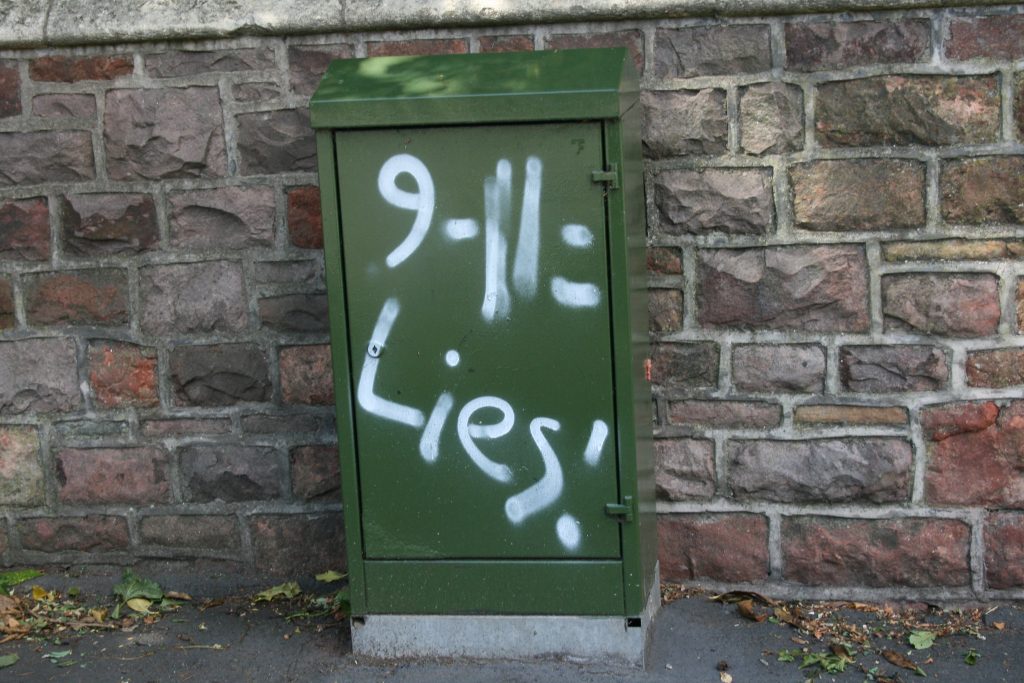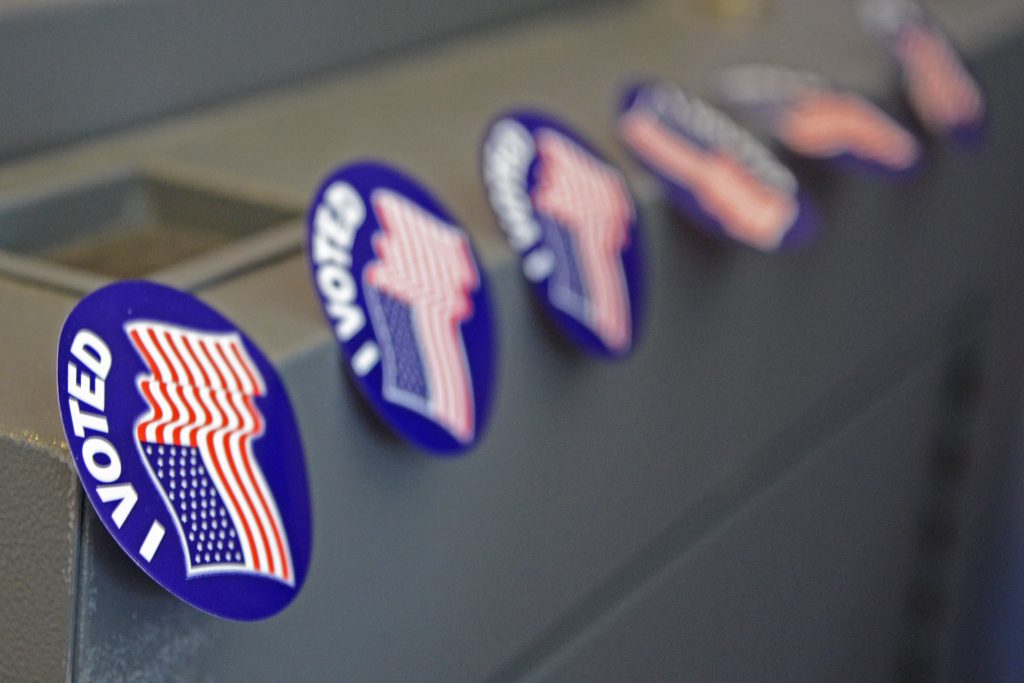My subject of interest is conspiracy theories. I’ve written 20 articles for this site and only a few are about something other than conspiracy theories. I’ve never really encountered a lack of material for the subject; conspiracy theories exist about everything and anything. In the course that I teach on the subject, I initially had to focus on the “greatest hits” of conspiracy theories: Moon landing deniers, JFK assassination theories, 9/11 “truth”, and the then growing Flat Earth movement. I used conspiracy theories as a way to teach critical thinking – here is why the people shilling for gold are wrong (it’s just as much of a currency as anything else), these are the fallacies you need to accept to believe the 9/11 truth movement, etc.
Then the world changed. My country elected President Trump on the basis – at least in part – of a series of anti-immigrant conspiracy theories, economic pseudoscience, and a purposeful misunderstanding of climate science. The UK Brexited based on – again, at least in part – anti-immigrant conspiracy theories, misrepresented economic regulations, and the shapes of bananas. Conspiracy theories moved from the fringe sections of conservative parties to the centres of them. As actual government policies began to shift, we started to understand that those elected officials weren’t just giving lip service to the conspiracy theory believer, they were believers as well.
One of my dissertation advisers wrote that it was not our differences that divide us, it is division. Conspiracy theories serve to widen those gaps. They place one group in a perceived state of oppression that they claim the other is responsible for. This was most obvious during the pandemic, where “they” were trying to get us to take ‘poison’ vaccine shots to prevent a disease that didn’t exist.
How could anyone refuse the Covid-19 vaccine? It didn’t make sense, because the disease had so fundamentally changed the world, and the vaccine was going to change it back. During my dissertation defence, which was over Zoom because of the pandemic, I did something rare for a philosophy dissertation: I made a prediction. I predicted that if a vaccine was created, society wasn’t ready to face the refusal of it – unfortunately, I was right. The fact that the vaccines were going to fix the world did not matter, because the emotional weight of the conspiracy theories was far heavier.
Plenty of writers for this magazine, including myself, have stressed that what attracts people to conspiracy theorising (and I include CAM and pseudoscience in the term “conspiracy theory”) is never the facts. Moon landing denialists aren’t attracted to the theory based on the “c-rock” or the radiation from the Van Allen Belts; it’s their suspicion that the government is lying to us, that they are smarter than the rest of us, or that they have a need to feel unique. Skeptics have spilled lots of ink and burned many pixels making this point, so I won’t retread those points in this article.

The unimportance of facts is so important that we must repeat it to those around us, and then slap our forehead when no one listens. I can present a series of links to academic studies that argue facts do not work and, when people still won’t believe me… well, that just proves the point, actually. What matters, the most important thing in dealing with conspiracy theories, is the motivation.
In recent memory, it’s been kind of easy to deal with conspiracy theories because they were all things that “they” believed. I prefer not to call conspiracy theory believers my “opponents” because that implies a desire for conflict when what I want is unity. I feel for these people, and I share their frustrations in the world around us. It was easy because conspiracy theories about Brexit or Trump were not “our” beliefs. We could feel a sense of righteous justification when we tried to combat the theories because they were not only objectively wrong, but also involved the dehumanisation of groups of people. Skepticism about conspiracy theories is easy, when it’s them. It’s much harder when it’s us. It’s much more difficult to look at our allies and friends to ask, “How do you know that is true?”
As the world knows now, my country re-elected a twice-impeached convicted felon to the office of President. This result is largely shocking to those of us in the US skeptical community, and I would hazard to claim the rest of you as well. It was only a few months ago that I wrote about the president-elect’s conspiracy views. When election night rolled around, I was nervous, anxious, but hopeful. Harris had momentum and Trump, I reasoned, could not have picked up new supporters. I assumed that Harris would inherit President Biden’s numbers and, worst-case scenario, Trump would just hold the line. I was not expecting a repeat of 2004, when your press asked how America could be so dumb (It was the Daily Mirror but still…).
All of the -isms (racism, nationalism, etc), the warnings about Project 2025, the misogyny, the threat to use the military against protestors; none of that mattered. None of it mattered because all of that was subservient to the anger and frustration that his voters felt. Yes, they were motivated by conspiratorial reasoning. Yes, he lost votes, but not enough.
When the dust settled and he was, once again, president-elect, those on the political left began noticing something weird, or “interesting.” It wasn’t writers like Aaron Rabinowitz, writing here about what compels young men in the US to vote for Trump. Nor is it the numerous think pieces on what Harris did wrong, what Biden did wrong, or what the Democrats did wrong (there are way too many to link, and they just keep coming).
It was that 15m people who voted for Biden/Harris in 2020 apparently didn’t vote for Harris/Walz in 2024. This was interesting, because it didn’t seem that there would be much difference in a Harris administration and a Biden administration, especially given that she is his Vice President. The salient difference is that she’s much younger than him, which ought to have overcome the trepidation that voters had regarding Biden’s re-election campaign. So, they seemingly just didn’t show up.

Conspiracy theories from the left began erupting. There must have been interference in the election process. Whether that came from the Chinese or Russian governments, Trump’s own people, or right-wing election terrorists; something must explain why that 15m sat it out. It wasn’t the first time we saw this kind of thinking – a few months prior, left-wing conspiracy theories also abounded about the attempted assassination of Trump, too. At the time, conspiracy theories exploded, claiming that the attempt was faked in order to gain support. The biggest mystery of that shooting, though, is how quickly we moved on from it; but questioning these notions earned the ire of people that were supposed to be skeptical of such theories.
If there is anything that serves as proof for the emotional draw of conspiracy theories, it’s when it comes from our own side. Conspiracy theories about the missing 20m, 15m, or 8m votes, are just that – conspiracy theories. The idea that the missing votes were stolen is much easier to swallow than the possibility that the number just reflects voter apathy toward the Harris/Walz candidacy.
It’s easier to believe in shenanigans than accept the idea that so many people were unconcerned about the possibility of the incoming administration. Women who were unconcerned about the direct loss of bodily autonomy that Trump’s last administration caused through judicial appointments, people of various immigrant statuses who believe that it’s not “them” that the administration will target, and those people who know that the incoming administration does not understand what a tariff does; so this number needs to explain why a large portion of the Biden/Harris voters decided to stay on the bench for the Harris/Walz.
Maybe. The ultimate problem with the conspiracy theory is that the 2020 number is a final number while the 2024 number is a developing one. While the election is over, the final tally is going to be something that we must wait for. The election will not be officially certified until January, and only then will we get the final number of voters in the 2024 US election.
The conspiracy theory is a knee-jerk reaction to a shocking result. Any conspiracy theory in a developing story is like that. What is important for skeptics is that we understand that while our emotional reaction to events is not something we can control, we can control our ability to recognise it.



